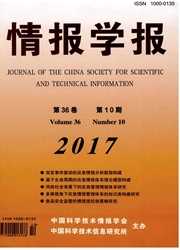

 中文摘要:
中文摘要:
微信知识服务是高校知识服务的新形式,对高校科研有重要的影响。运用扎根理论的质性研究方法,通过对5所“211高校”的32位专业知识服务人员和科研人员进行深度访谈,研究面向高校科研的微信知识服务影响因素构成以及其作用路径;通过开放式编码、主轴编码、选择性编码和理论饱和度检验,并最终形成其关键影响因素与作用路径模型(RPDSMWA模型)。研究发现:微信知识服务的关键影响因素主要由微信应用动机、微信参与意愿、知识服务感知、微信体验情境、知识服务资源和科研阶段性需求等6个范畴构成;微信知识服务的关键影响因素间的正向相互作用,能够共同促进高校科研绩效的提升。
 英文摘要:
英文摘要:
WeChat knowledge service is a new form of knowledge service in universities, which has an important in- fluence on university scientific research. This paper used grounded theory in qualitative research methods to study the influence factors and action path of WeChat knowledge services to scientific research in universities. And then the paper used the way of open coding, spindle encoding, selective coding and theoretical saturation test. The paper carries out a depth interview to 32 persons is knowledge service personnel or teachers in colleges and universities, which were come from 5 "211 colleges and universities". This paper finally formed the model of the influence factors and action path (The RPDSMWA Model). The study founded: the influence factors of WeChat knowledge services to scientific research in universities have composed of 6 categories, such as WeChat application motivation, WeChat willingness to participate, knowledge service perception, WeChat experience situation, knowledge service resources and research needs of the stage. And the positive interaction between the key influencing factors of WeChat knowledge service can promote the improvement of performance of the scientific research in Universities.
 同期刊论文项目
同期刊论文项目
 同项目期刊论文
同项目期刊论文
 期刊信息
期刊信息
